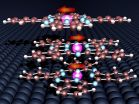(Press-News.org) A new drug that blocks cancer's escape route from chemotherapy could be used to treat deadly lung and pancreatic cancers, new research reports.
Scientists have shown in human cancer cells and in mice that the drug - discovered at The Institute of Cancer Research, London - boosts the effectiveness of conventional chemotherapy.
The drug, known as CCT245737, is scheduled to begin first-in-human clinical trials in patients with lung and pancreatic cancers - two cancers with low survival rates that continue to resist currently available treatments.
The new study is published in the journal Oncotarget, and was funded by Cancer Research UK and Sareum Limited.
The research, conducted at The Institute of Cancer Research (ICR) in collaboration with colleagues at the drug discovery company Sareum and Newcastle University, shows the effectiveness of a new class of drugs called CHK1 inhibitors that can be delivered orally to patients.
Most chemotherapies work by damaging the DNA of rapidly dividing cells. But in response, cancer cells activate a molecule called CHK1 which delays cell division and gives cancer cells time to repair their damaged DNA.
Scientists hoped that blocking CHK1 could stop cancer cells from repairing DNA damage and prevent them from becoming resistant to the cell-killing effects of chemotherapy.
Researchers developed techniques to assess the method of action of CCT245737 in human cancer cell lines, and demonstrated that it potently blocked the molecule CHK1.
They also assessed CCT245737 in combination with chemotherapy in mice with tumours grown from human cancer cell lines, and found it achieved much greater anti-cancer activity than chemotherapy alone. Importantly, the mice did not experience any additional toxicity of the combined drugs.
Researchers also found that the CHK1 inhibitor could be used alone, without additional chemotherapy, to treat a type of blood cancer called lymphoma because this cancer type sustains heavy DNA damage during its formation.
It is possible that CHK1 inhibitors such as CCT245737 - which was designed and synthesised at the ICR with funding from Cancer Research UK - could be used on their own to treat other types of cancer with similar levels of DNA damage.
The intellectual property associated with the project was licensed to the CRT Pioneer Fund (CPF) who are now working with Sareum, to take the project into Phase I clinical trial before commercialisation.
Professor Ian Collins, Professor of Medicinal Chemistry at The Institute of Cancer Research, London, said:
"We're excited that our new CHK1 inhibitor, which was discovered at the ICR in collaboration with Cancer Research UK and Sareum, is progressing towards first-in-human clinical trials.
"By using CHK1 inhibitors with chemotherapy, we block one of cancer's escape routes and prevent tumours from evading the effects of treatment. We hope that clinical trials of our new drug will show it to be an effective chemotherapy booster in lung and pancreatic cancers, which readily become resistant to current treatments."
Dr Tim Mitchell, CEO of Sareum Limited, said:
"The publication of CCT245737 data in this high-impact journal will bring what we believe to be a best-in-class drug candidate to the attention of our peers and potential licence partners. The preclinical studies are progressing well and we look forward to providing an update with our final results."
Dr Phil L'Huillier, Cancer Research Technology's director of business development, said:
"The CRT Pioneer Fund was set up to help bridge the funding gap between the lab and the clinic and we're delighted that this investment from CPF and Sareum means a promising molecule is now ready for clinical trials. Lung and pancreatic cancers have some of the lowest survival rates of any cancer type, so we hope this vital injection of cash and resources will mean patients can benefit from this research sooner."
INFORMATION:
Notes to editors
For more information contact Claire Hastings, Media Officer at the ICR, on 020 7153 5380 / chastings@icr.ac.uk. For enquiries out of hours, please call 07595963613.
The Institute of Cancer Research, London, is one of the world's most influential cancer research institutes.
Scientists and clinicians at The Institute of Cancer Research (ICR) are working every day to make a real impact on cancer patients' lives. Through its unique partnership with The Royal Marsden NHS Foundation Trust and 'bench-to-bedside' approach, the ICR is able to create and deliver results in a way that other institutions cannot. Together the two organisations are rated in the top four cancer centres globally.
The ICR has an outstanding record of achievement dating back more than 100 years. It provided the first convincing evidence that DNA damage is the basic cause of cancer, laying the foundation for the now universally accepted idea that cancer is a genetic disease. Today it leads the world at isolating cancer-related genes and discovering new targeted drugs for personalised cancer treatment.
As a college of the University of London, the ICR provides postgraduate higher education of international distinction. It has charitable status and relies on support from partner organisations, charities and the general public.
The ICR's mission is to make the discoveries that defeat cancer. For more information visit http://www.icr.ac.uk
A team of researchers from the University of Leicester and France's G2ELab-CNRS in Grenoble have for the first time observed the growth of free nanoparticles in helium gas in a process similar to the decaffeination of coffee, providing new insights into the structure of nanoparticles.
Nanoparticles have a very large surface area compared with their volume and are often able to react very quickly. This makes them useful as catalysts in chemical reactions and they are often used in sports equipment, clothing and sunscreens.
In a paper published by the Journal of Physical ...
Contact between children and fathers following parental separation facilitates the continued abuse of women and children, according to new research focusing on the experiences of families with a prior history of domestic abuse conducted by social work experts at Trinity College Dublin.
The research, which explored the experiences of post-separation fathering in families with prior history of domestic abuse perpetrated by the father against the mother, involved the completion of survey questionnaires 219 mothers regarding their 449 children as well as face-to-face interviews ...
TAMPA, Fla. - Recent advances in the understanding of cancer have led to more personalized therapies, such as drugs that target particular proteins and tests that analyze gene expression patterns in tumors to predict a patient's response to therapy. Moffitt Cancer Center researchers have contributed to these advances by developing the first test that analyzes the sensitivity of tumors to radiation therapy. They discovered that colon cancer metastases have varying sensitivity to radiation therapy based on their anatomic location.
Researchers from Moffitt previously developed ...
An algorithm dubbed ENVE could be the Google for genetic aberrations -- and it comes from Case Western Reserve.
Remember the World Wide Web before the famed search engine? The web offered extraordinary amounts of information, but no consistently reliable way to secure relevant results.
Cancer researchers at Case Western Reserve encountered a comparable conundrum when considering reams of data about the body that new technological advances provide -- how could they tell what parts of the information actually offer value. In this instance, the goal was to distinguish ...
This news release is available in German.
Organic molecules allow producing printable electronics and solar cells with extraordinary properties. In spintronics, too, molecules open up the unexpected possibility of controlling the magnetism of materials and, thus, the spin of the flowing electrons. According to what is reported in Nature Materials by a German-French team of researchers, a thin layer of organic molecules can stabilize the magnetic orientation of a cobalt surface. (DOI: 10.1038/NMAT4361)
"This special interaction between organic molecules and metal ...
Reintroducing a species into an area where it has vanished can be a great tool for conservation, but for reintroduction to be successful it's crucial to understand how the habitat has changed in the interim and whether the reintroduced species will be able to thrive in its former home. Extirpated in the 1960s as a result of human activity, Bald Eagles (Haleiaeetus leucocephalus) have been reintroduced to California's Channel Islands over the last 35 years. A study published this week in The Condor: Ornithological Applications examined the diets of these reestablished eagles ...
People who grew up in a working class family are more satisfied in later life than those from a higher class background according to new research from The University of Manchester.
The study by Dr Bram Vanhoutte and Professor James Nazroo, published in the Journal of Population Ageing, also found that English people who climb the social ladder are more content and happy when they get older than people in the States who are similarly upwardly mobile.
The research sought to find out whether social mobility makes people happier in later life while taking into account ...
Investigators affiliated with VIB and UGent recently achieved great success with a study involving biomedical research on mouse models. The research group of Prof Peter Vandenabeele (VIB/UGent) recently used tangible examples to demonstrate how the side effects of genetic modification of mice can complicate the interpretation of biomedical research. The team developed a web tool that allows scientists to estimate the impact of this phenomenon more accurately. Their findings were recently published in the medical journal Immunity and received ample attention by a preview ...
Mangrove forests could play a crucial role in protecting coastal areas from sea level rise caused by climate change, according to new research involving the University of Southampton.
A joint study between researchers at the University of Southampton along with colleagues from the Universities of Auckland and Waikato in New Zealand used leading-edge mathematical simulations to study how mangrove forests respond to elevated sea levels.
Taking New Zealand mangrove data as the basis of a new modelling system, the team were able to predict what will happen to different types ...
The U.S. Supreme Court's recent ruling legalizing marriage between same-sex couples in all 50 states follows on the heels of national polls showing rapid cultural changes in attitudes toward lesbian and gay people. A new University of Virginia study confirms this, showing that not only are Americans' conscious and unconscious biases against lesbian women and gay men decreasing across all demographic groups, but the trend also appears to be accelerating.
"Many people have this gut feeling that our culture has changed," said lead researcher Erin Westgate, a doctoral psychology ...

